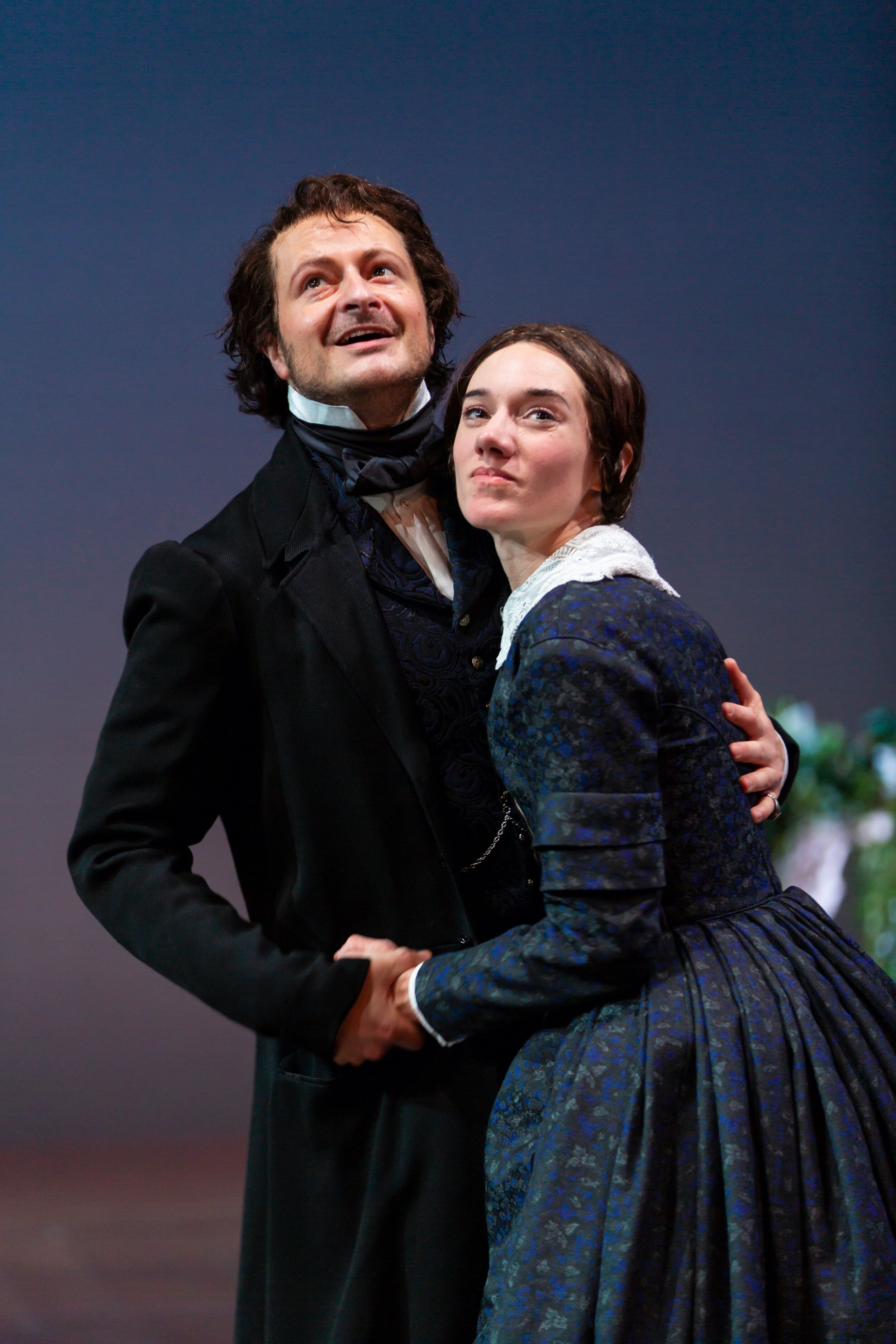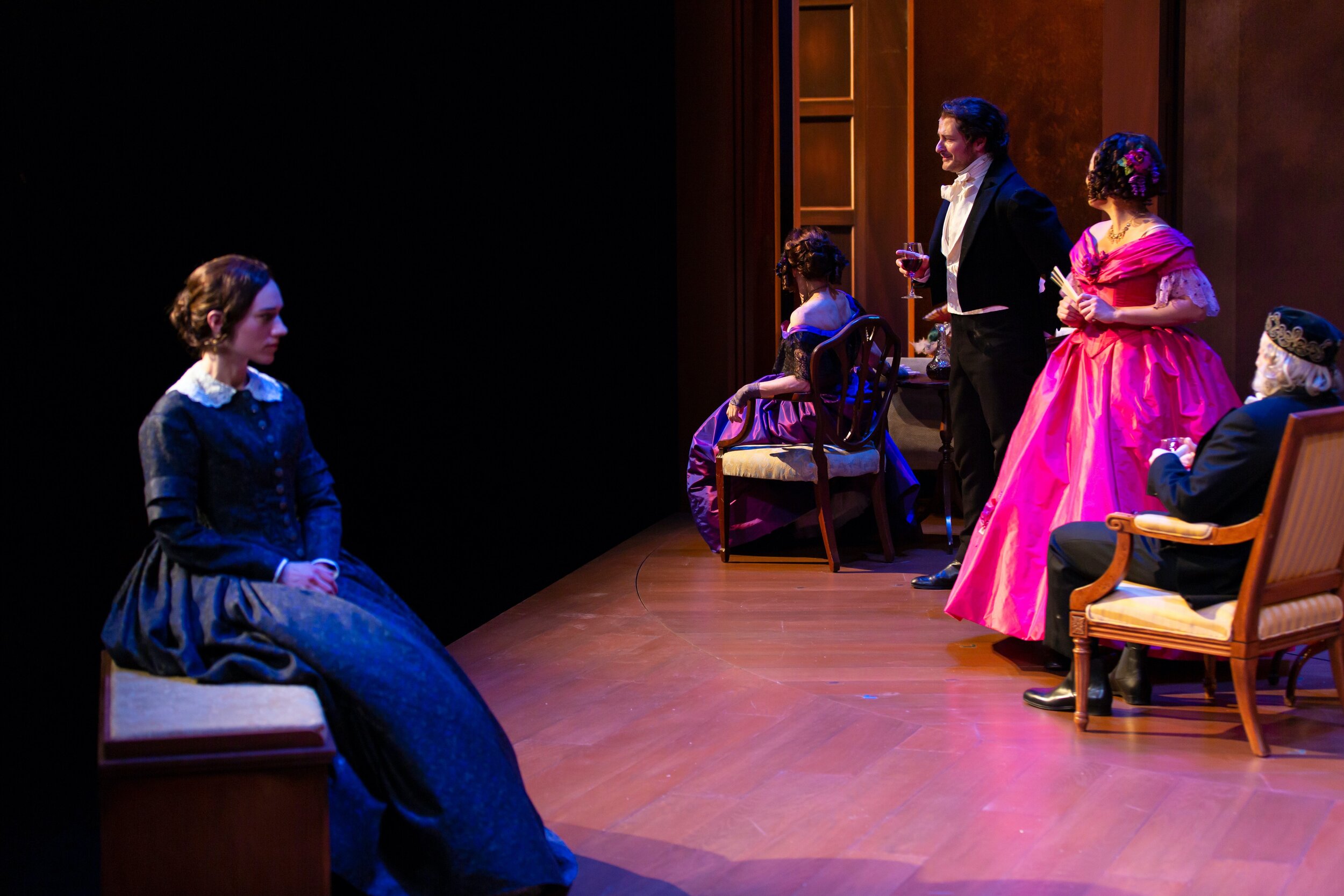Review of Jane Eyre, Hartford Stage
Charlotte Brontë’s Jane Eyre has the distinction of being one of the first great first-person narratives in British fiction and probably the earliest great first-person narrative by a female author. Most other early examples of a woman narrating her own story—Moll Flanders comes to mind—were written by a man in character as a woman. Brontë’s Jane tells her own story and addresses her “dear Reader” directly. The intimacy is key to the story. It’s a confession, of sorts, but a confession in which the point is how one becomes who one is. Jane, come from obscurity with only harmful relatives (she believes), makes her way in the world with gumption, an enduring sense of her own dignity, a passionate sense of right and wrong, a perhaps revolutionary sense of woman’s due, and an admirable way with a story.
John Reed (Grayson DeJesus), Child Jane (Meghan Pratt) in Elizabeth Williamson’s adaptation of Jane Eyre at Hartford Stage (photo by T. Charles Erickson)
Adapted the novel has been before, often. Many film versions—I’ve seen at least three—and no doubt stagings. At Hartford Stage, Associate Artistic Director Elizabeth Williamson directs her own adaptation and, in this era when Kate Hamill has engendered a cottage industry of comic adaptations of the kind of British—and even American—classics formerly the stuff of Masterpiece Theater (her Pride and Prejudice has been produced twice this theater season in Connecticut), it’s important to say what Jane Eyre isn’t. It’s not a light-hearted rewrite in the arch tones of contemporary feminism. It’s very faithful to our beloved Jane—and it wisely leaves out the years at the grim Lowood school, a sequence which, though based on real experience, might seem too Dickensian.
And, despite its lack of big whizbang effects (for that famed fire at Thornfield or for moody moors and encounters with a rearing horse), this Jane Eyre works. And that’s because Helen Sadler, as Jane, and Chandler Williams, as Mr. Rochester, are doing very fine work. Certainly, it’s the best romantic pairing of the season.
Mr. Rochester (Chandler Williams), Jane Eyre (Helen Sadler) in Elizabeth Williamson’s adaptation of Jane Eyre at Hartford Stage (photo by T. Charles Erickson)
Rochester, for starters, is a figure so familiar in his gnomic oddity as to be easily lampooned or sent-up. All the trappings of the Gothic—the peremptory Master of a mansion who has a mysterious past, the hapless but helpful governess who arrives and must somehow set things right, the knowing but not-forthcoming servants, the forbidding clime—are here, and Williamson manages to keep them in play without making them clichés. And that’s because Jane, in her forthright effort to show things as she lived them, isn’t the kind to overdramatize or satirize. Getting her tone is essential, and Williamson’s script does.
Jane (Helen Sadler), Mr. Rochester (Chandler Williams) in Elizabeth Williamson’s adaptation of Jane Eyre at Hartford Stage (photo by T. Charles Erickson)
Jane is right in what she thinks and says, and Sadler looks and sounds right as Jane. When she misreads something, we see her error and can watch her come to terms. Her outbursts carry a force that never gets teary or—that great Victorian affliction—overwrought. Her interactions are never too good to be true because Jane’s sense of others is apt to be realistic, for our benefit. She is cautious but not captious. And she’s stirred by her belief that Rochester might actually be her match.
And Williamson’s grasp of Brontë’s tone means that Chandler gets to render an enduring Rochester, a figure who feels like what a female author enamored of Byron and Shakespeare would fashion. He’s mercurial in temper, given to having his way, and, of course, wonderingly struck by a kind of woman he hasn’t encountered before. Chandler lets his body language and an entertaining array of vocal mannerisms create a Rochester as fascinating as Jane feels him to be.
Jane (Helen Sadler), Mrs. Fairfax (Felicity Jones Latta) in Elizabeth Williamson’s adaptation of Jane Eyre at Hartford Stage (photo by T. Charles Erickson)
All the other characters are ancillary but that doesn’t mean there isn’t still real pleasure, as always, in seeing two veterans of various Connecticut stages—Felicity Jones Latta and Steve Routman—play a variety of roles. Latta is all the elder women in Jane’s life, which makes for an interesting alignment of Mrs. Fairfax, the helpful housekeeper who hired Jane; Aunt Reed, the vindictive relation who dismissed her and who on her deathbed still rejects her; Lady Ingram, the snooty mother of a belle out to snare Rochester; and Bertha, the madwoman in the attic. Routman gets to move through the distinct ranks of British society, the peasant, the military man, the aristocrat, and the cleric. Grayson DeJesus enacts two important potentially spoiler roles, quite different in effect, as Mason, the man who knows of Rochester’s past, and as St. John Rivers, the man who may have a future for Jane. Marie-France Arcilla plays Jane’s rival, her kindly nursemaid when a girl, and a servant with a secret Jane needs to know. Megan Gwyn is primarily Jane’s honorary sister in a family who helps her, and Meghan Pratt is both the child Jane, mistreated and outspoken, and little Adèle, Jane’s French-speaking charge at Thornfield Hall.
The cast of Jane Eyre in Elizabeth Williamson’s adaptation of Jane Eyre at Hartford Stage (photo by T. Charles Erickson)
The Hall itself is suggested, in Nick Vaughn’s set, by a handsome array of sliding partitions that can open at times to suggest a house beyond, but that can also withdraw to present a stand of trees. There are some nicely done effects with silhouettes and with a turning stage that allows Jane’s narrative to move people on and off as needed. As with Hartford Stage’s popular adaptation of A Christmas Carol, scenery is kept to a minimum and the story moves through an amorphous space that leaves much to our imaginations.
Old-fashioned? Certainly. Jane Eyre is a classic revisited for the satisfactions this intricate and involving story can still deliver and, in Elizabeth Williamson’s succinct and affecting adaptation at Hartford Stage, deliver them it does.
Jane Eyre (Helen Sadler) in Elizabeth Williamson’s adaptation of Jane Eyre at Hartford Stage (photo by T. Charles Erickson)
Jane Eyre
Adapted from Charlotte Brontë’s novel and directed by Elizabeth Williamson
Scenic Design: Nick Vaughn; Costume Design: Ilona Somogyi; Lighting Design: Isabella Byrd; Sound Design: Matt Hubbs; Original Music: Christian Frederickson; Wig & Hair Design: Jason Allen; Dialect Coach: Claudia Hill-Sparks; Fight Choreographer: Greg Webster; Dramaturg: Fiona Kyle; Production Stage Manager: Hannah Woodward; Assistant Stage Manager: Kelly Hardy; Production Manager: Bryan T. Holcombe
Cast: Marie-France Arcilla, Grayson DeJesus, Megan Gwyn, Felicity Jones Latta, Meghan Pratt, Steve Routman, Helen Sadler, Chandler Williams
Hartford Stage
February 13-March 14, 2020





